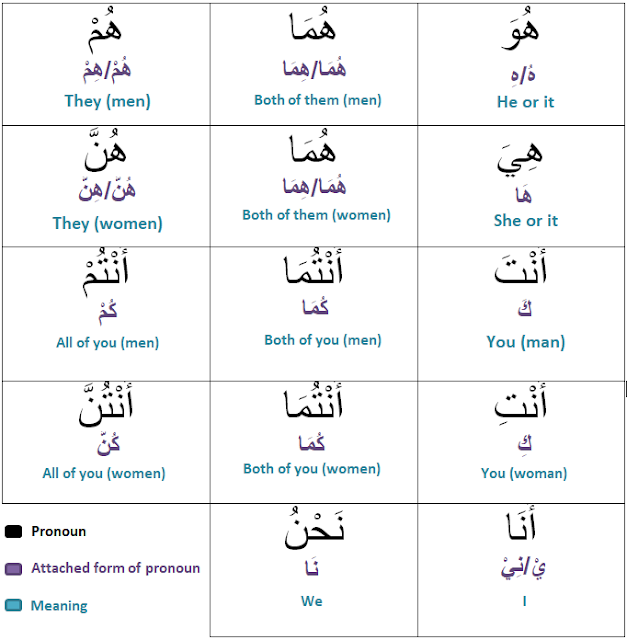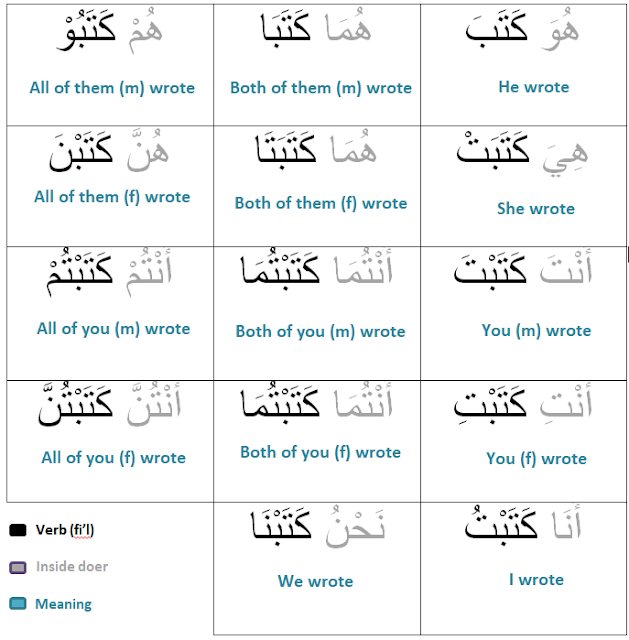Mudhaaf and Mudhaaf ilaihi
مُضَاف وَ مُضَاف إِلَيه
Till now in this course, we looked at isms (nouns) and fi’ls
(verbs) in Arabic. If you have not gone through those lessons, be sure to go
through them and be clear with them before you start on this new chapter.
Previously
we looked at how different words appear in the Arabic language. Today, we are
starting a new chapter named ‘Fragments.’ or phrases. A fragment is more than a
word and less than a sentence.
Eg: Tall
tree.
When at
least two words come together, they make
a fragment. There are 5 kinds of fragments.
Today we are
going to learn one kind of fragment called ‘mudhaaf-mudhaaf ilaihi’.
Let’s look
at examples of mudhaaf-mudhaaf ilaihi in English.
The Day of Judgement
The house of Allah
My car (Car of mine)
Your pencil (Pencil of yours)
Aisha’s notebook (Notebook of Aisha)
We can’t put
a full-stop at the end of these hence these are fragments, not sentences.
All the
above phrases have something in common. And that is the word ‘of’ in between
the two words.
The first
kind of ‘of’ is obvious and the other kind is not obvious.
For example
the fragments that have: her, his, my, our, your, their.
These are
after ‘of’
Her binder –
Binder of hers
His nose –
Nose of his
My test – Test
of mine
Our house –
House of ours
Your class –
Class of yours
Their school
– School of theirs.
So when you
see her, his, my, our, your, their you know that there is an ‘of’ hidden.
These words
are always after ‘of’.
The third
kind of ‘of is with an ‘s
Eg: Allah’s house – House of Allah
Father’s computer – Computer of
father
Whatever is
with ‘s is the word after ‘of’.
In Arabic
there is only one way of doing all 3
The part
before ‘of’ comes first and the part after ‘of’ comes second.
Terms to
remember:
Part before ‘of’
= Mudhaaf
Part after ‘of’
= Mudhaaf ilaihi
Exercise:
Identify the Mudhaaf and Mudhaaf ilaihi
Eg: The Day
of Judgement
Mudhaaf –
Day
Mudhaaf
ilaihi – Judgement
Eg 2: My car
Can be said
as ‘car of mine’
Hence:
Mudhaaf is car and mudhaaf ilaihi is ‘my’
Fragment
|
Mudhaaf
|
Mudhaaf ilaihi
|
House of Allah
|
||
My book
|
||
Your pencil
|
||
Aisha’s notebook
|
Now, let’s
take a look at an Arabic example
كِتَابُ اللّهِ
In Arabic,
the word ‘of’ does not exist. So how do we know which is the mudhaaf and which
is the mudhaaf-ilaihi.
We have to
look for other clues to find out the mudhaaf and mudhaaf ilaihi.
NOTHING
comes in between a mudhaaf and mudhaaf ilaihi in Arabic. Those two are
inseparable.
Mudhaaf has
2 rules and mudhaaf ilaihi has 1 rule
2 Rules
of Mudhaaf
1. Mudhaaf has to
be light (can’t have a tanween or a ن
– view previous lesson
on light vs heavy)
2. Mudhaaf cannot
have an ال
Rule of
Mudhaaf ilaihi
Mudhaaf
ilaihi has to be in Jarr status. (should end with a kasra/AINI sound or EENA sound
– view lessons of status)
Look at this
example:
كِتَابُ اللّهِ
كِتَابُ is the mudhaaf. It does not
have a tanween or a ن. And it does not have an ال
either.
The word اللّهِ
is the mudhaaf ilaihi. As you can see it is in Jarr status since it ends with a
kasra.
Hence this
fragment can be translated as ‘Book of Allah.’ Since we can identify this
fragment as a mudhaaf-mudhaaf ilaihi fragment.
More
examples of identifying whether the fragment is mudhaaf-mudhaaf ilaihi or not.
1. غَفُوْرٌ رَّحِيْمٌ
There is no
mudhaaf-mudhaaf ilaihi in this. Since mudhaaf has to be light and there is no
word that is light.
2. يَوْمٍ كَبِيْرٍ
Cannot be
mudhaaf and mudhaaf ilaihi since mudhaaf has to be light and there is no light
word.
3. يَوْمِ نَحْسٍ
Can be mudhaaf
and mudhaaf ilaihi since it follows all the rules.
4. الْيَوْمِ
الْمَوْعُوْدِ
Cannot be
mudhaaf and mudhaaf ilaihi since the first word has an ال .
Mudhaaf can’t have an ال.
Mudhaaf-mudhaaf
ilaihi (Exercise 1)
Identify the
mudhaaf and mudhaaf ilaihi in the following.
Fragment
|
Mudhaaf
|
Mudhaaf ilaihi
|
Night of power
|
||
Messenger of Allah
|
||
The Creator of the universe
|
||
The people of the book
|
||
Our signs
|
||
The teacher’s book
|
||
Their hands
|
||
Your Master
|
||
His permission
|
||
Their prayer
|


Comments
Post a Comment